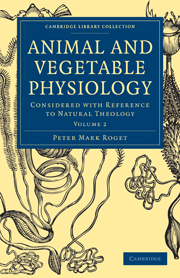CHAPTER II - ORGANIC DEVELOPEMENT
Published online by Cambridge University Press: 05 October 2010
Summary
Although the study of organic structures in their finished state must tend to inspire the most sublime conceptions of the Great Creator of this vast series of beings, extending from the obscurest plant to the towering tenant of the forest, and from the lowest animalcule to the stately elephant and gigantic whale, there yet exists another department of the science of Nature, removed, indeed, from the gaze of ordinary observers, but presenting to the philosophic inquirer subjects not less replete with interest, and not less calculated to exalt our ideas of the transcendent attributes of the Almighty. To a mind nurtured to reflection, these divine attributes, whether of power, of wisdom, or of beneficence, are no where manifested with greater distinctness, or arrayed in greater glory, than in the formation of these various beings, and in the progressive architecture of their wondrous fabric.
Our attention has already been directed, in a former part of these inquiries, to the successive changes which constitute the metamorphoses of winged insects, and of Batrachian reptiles, phenomena which are too striking to have escaped the notice of the earliest naturalists: but the patient investigations of modern inquirers have led to discoveries still more curious, and have shown that all vertebrated animals, even those belonging to the higher classes, such as birds, and mammalia, not excepting man himself, undergo, in the early stages of their developement, a series of changes fully as great and as remarkable as those which constitute the transformations of inferior animals.
- Type
- Chapter
- Information
- Animal and Vegetable PhysiologyConsidered with Reference to Natural Theology, pp. 599 - 618Publisher: Cambridge University PressPrint publication year: 2009First published in: 1834



